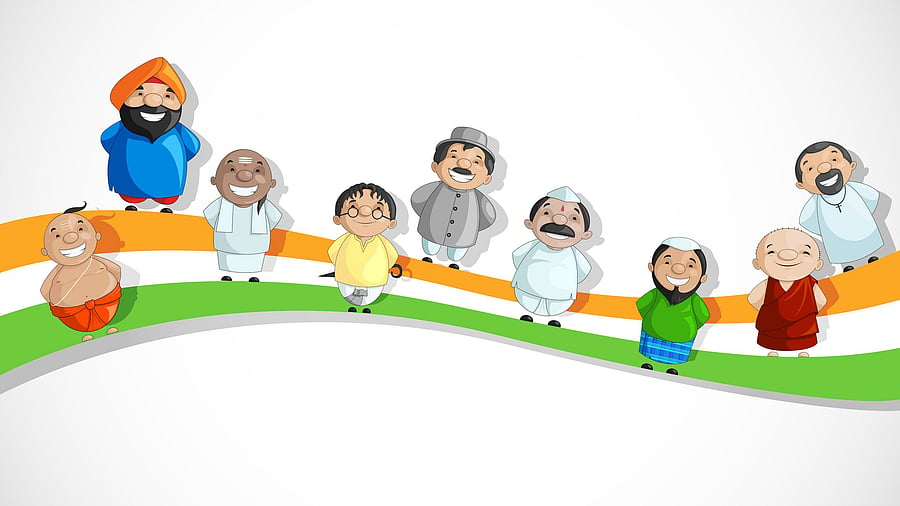
Image for representation.
Credit: iStock Photo
A cursory examination of the political discourse in India over the past decade reveals that it has undergone a profound shift. This shift was brought about due to the constant appeal to raw emotion and basic ‘visceral’ instinct within each one of us, instead of our reason.
India had a distinct modern persona by integrating several civilisational milestones. But this has been forgotten in a short span of a decade. We have failed to understand that continuously whipping up raw emotions is detrimental to the democratic fabric of a country like ours.
A true and vibrant democracy depends on informed debate, reasoned judgment, and policies based on evidence. Institutions, whether they are courts, parliaments, universities, or the media — derive their legitimacy from the perception that they operate according to principles of fairness, consistency, and reasoned deliberation.
However, when leaders stoke raw emotions, especially fear, anger, or resentment, it short-circuits this process, and makes it harder for citizens to engage thoughtfully with complex issues and major concerns of their everyday life. As emotional manipulation replaces rationality and dialogue, it erodes institutions and inevitably leads to a lack of public trust in these institutions.
The tendency of many Bharatiya Janata Party (BJP) leaders to speak in the language of polarisation along religious or ethnic lines, is shaped by a combination of personal ambition, political strategy, ideological roots, and electoral calculus. Such statements are sugar-coated in emotional appeals, which often involve scapegoating or conspiracy thinking. This has led to substantial damage to trust in key democratic institutions, like the judiciary, the press, or even the electoral system. If people are constantly told to feel outrage or fear, they may begin to distrust any institution that does not align with those emotions — even when those institutions which may be working efficiently.
Emotionally-charged rhetoric often frames political opponents as enemies rather than fellow citizens with different views. This deepens social divisions and creates a toxic ‘us vs them’ environment, making compromise and co-operation — the lifeblood of democracy — far more difficult. Emotionally-loaded polarising rhetoric is aimed at consolidating the majoritarian vote base, particularly in states with significant minority populations. This is often also used to conceal caste-based discrimination in the majority community. Such political posturing by the BJP is closely linked to the worldview of the Rashtriya Swayamsevak Sangh (RSS). Speeches about ‘love jihad’, cow protection, or other ‘historical’ grievances are used to reinforce a narrative of cultural assertion and civilisational pride which is bereft of evidence.
Unfortunately, the media, which was meant to be an alert watchdog guarding democracy, got embedded in the same ideological pool, and today, polarising remarks often get wide media attention, helping the leaders dominate the news cycles and divert focus from governance issues such as unemployment, inflation, or corruption. The trend of tapping into the so-called historical wounds to stir emotions begins from the top rung of the BJP leadership. These narratives are used to frame contemporary political issues as part of a larger cultural-political battle.
Leaders relying on emotional manipulation can become demagogues, prioritising popularity and spectacle over good governance, and there is no dearth of such leaders. Expertise in such emotional manipulation immensely helps them reject accountability, suppress dissent, or undermine checks and balances to maintain their hold on power through such appeals rather than legitimate democratic processes.
In a democracy, leadership should aim to calm, clarify, and unite — not provoke, distort, and divide. While emotion has a role in politics, when used irresponsibly, it weakens the foundations of a democratic society. It is high time India ‘reboots’ and discards hatred forever, and embraces harmony and equality not just as a moral or idealistic stance, but as a practical necessity for its survival, stability, and success. India was built on the values of pluralism, secularism, and tolerance, deeply entrenched in its Constitution and freedom struggle. Whipping up hatred corrodes this, and threatens the unity that holds such a diverse country together.
No amount of counterfactual doses of history can deny that India is home to multiple religions, languages, cultures, and ethnicities. Its uniqueness lies in this diversity. Fomenting hate and division weakens internal cohesion and leads to social fragmentation, making the nation vulnerable to internal unrest and external threats. Hatred breeds violence, distrust, and instability. We have seen in the last decade how unchecked hatred leads to waves of violence, polarisation, and the erosion of democratic institutions.
A peaceful and inclusive society is essential for equitable growth, job creation, and harmonious living. History offers many examples of how nations go down when they fail to confront and reject hate. In essence, rebooting means recommitting to the ideals that once bound India together, and working together to realise the Republic the founders sought to build where every citizen, regardless of identity, feels at home.
(Manoj Kumar Jha is an RJD leader, and Member of the Rajya Sabha. X: @manojkjhadu.)
Disclaimer: The views expressed above are the author's own. They do not necessarily reflect the views of DH.